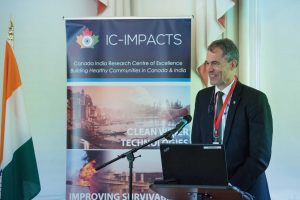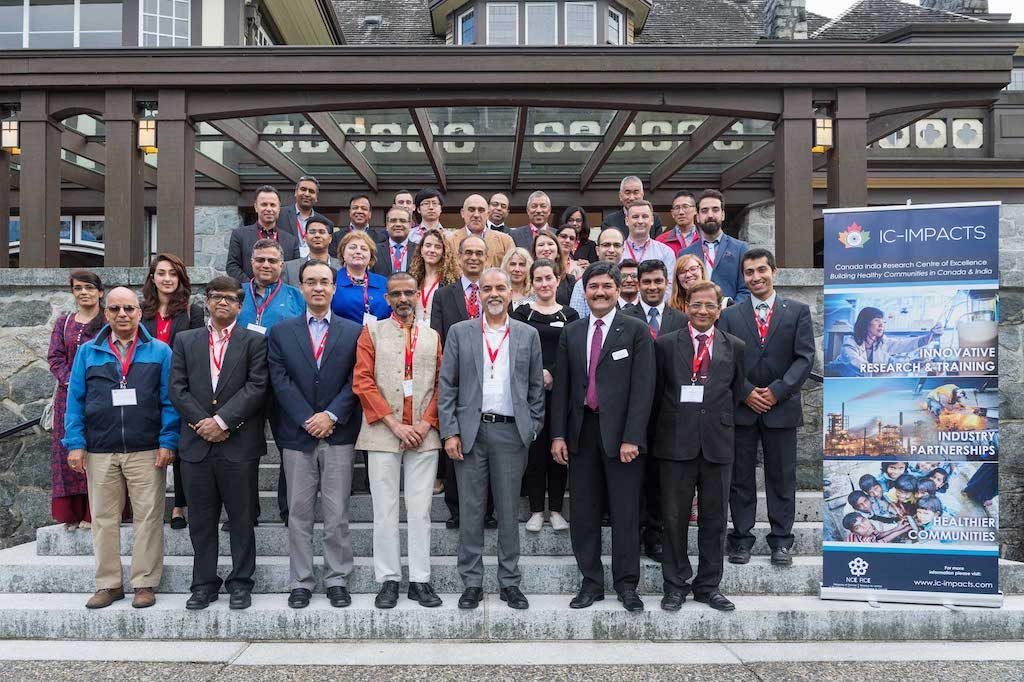On June 13, 2018, K. VijayRaghavan, Principal Scientific Advisor to the Government of India (Prime Minister Modi), was the first keynote speaker to address attendees at the Special Session, reflecting on the strength of IC-IMPACTS’ bilateral model of collaboration and role as a gateway to India and future opportunities for India-Canada partnerships.
Hosted at the Cecil Green Park House on UBC Vancouver Campus, the event brought together NCEs, industry, universities, NGOs, and government representatives for the purpose of exploring opportunities to scale up international economic development opportunities through IC-IMPACTS in its role as a gateway to India.
These ideas were initially broached at the NCE Annual Meeting 2018 in March, where IC-IMPACTS appealed to NCEs seeking collaborations with India to consider approaching IC-IMPACTS to develop research partnerships and explore opportunities to disseminate technologies in India.

IC-IMPACTS Board Chair Barj Dhahan welcomed attendees and advocated stronger India-Canada ties in the areas of science and technology as a way to face challenges and solve real-world problems in both countries.
CEO and Scientific Director of IC-IMPACTS Nemy Banthia outlined the successes of the centre in the first five years and the achievement of matching funding and equal participation by Canada and India. Banthia reflected on where IC-IMPACTS is headed in the next five years, discussed upcoming projects with a focus on First Nations communities and expanding partnerships with Networks of Centres of Excellence (NCEs).
Whatever research comes out of the [IC-IMPACTS] research program actually gets deployed into communities. And that’s our strength. That’s our signature strategy… putting those data out there and helping communities in terms of bringing those research findings into solving everyday problems. —Dr. Nemy Banthia
Banthia outlined two new calls for proposals to solve common problems facing Canada and India. One is a collaboration with the Government of India’s Department of Science and Technology (DST) on improving occupant survivability of buildings during fires. This is of particular concern as people in First Nations Communities are ten times more susceptible to die in house fires than the population at large.
A second is a collaboration with the Government of India’s Department of Biotechnology (DBT) and IIT (BHU) Varanasi on rejuvenating a stretch of the Ganga River in Varanasi. Any IC-IMPACTS technologies used to treat Ganga River in Varanasi will be used in a parallel body of water in Canada’s First Nations Communities.
In addition to launching these joint calls for proposals, IC-IMPACTS will be hosting a focus group in Ottawa on resilient housing in First Nations communities in July 2018. Planned with the Assembly of First Nations and supported by UBC Applied Science, this focus group will lead to a call for proposals on smart, resilient housing technology in First Nations communities.

These First Nations initiatives are in keeping with the role that IC-IMPACTS aims to expand: as a gateway for NCEs and other centres to Indian partnerships and international commercial development.
This role has already borne fruit: after the NCE Annual Meeting 2018 in March, the Rick Hansen Institute (RHI) approached IC-IMPACTS about forming partnerships with Indian spinal cord research institutes. The organizations have since formed a partnership with the Indian Spinal Injury Centre, whose aim is to improve the lives of those with mobility challenges. IC-IMPACTS is also developing a collaboration with the Kids Brain Health Network, a Network of Centres of Excellence hosted at UBC, to bring their technology to Indian communities.
Four keynote speakers from Canada addressed attendees, bringing new ideas forward to strengthen opportunities for IC-IMPACTS partnerships with India and to find avenues to bring research innovations to market. These speakers were:

Two panels followed the keynote speakers: one on finding opportunities to scale up economic development opportunities in India with NCEs and other research centres and the other on mobilizing Canada-India strengths to address social and economic challenges.
Arvind Gupta, Professor in Computer Science at UBC, moderated the first panel, which featured the following panellists:
After dynamic presentations, Gupta direct questions to the panellists, who offered ideas on improving trade and co-innovations that could improve the lives of people in Canada and India. While IC-IMPACTS has a successful track record of training HQP, developing innovations, creating patents, and launching start-up companies, there was broad agreement among panellists that one area that could be strengthened was commercializing innovations that result from research projects.
Mobilizing Canada-India strengths to address social and economic challenges was the topic for the second panel of the day. The panel featured four speakers:
The Special Session was a great success, prompting an exploration of new opportunities with NCEs and others to advance international economic development with India. The range and diversity of speakers and participants all served to contribute to dynamic discussions and opportunities for future partnerships. IC-IMPACTS would like to thank all attendees for their participation.

2024 IC-IMPACTS Conference in Delhi December 9 - 11, 2024 New Delhi, India